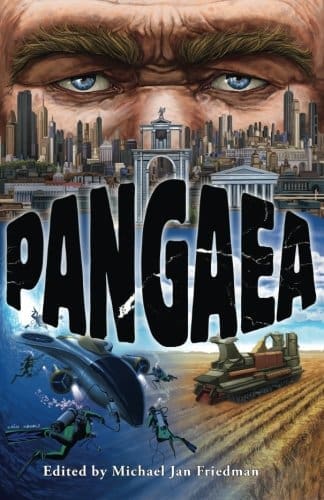By Michael A. Burstein
 When Michael Jan Friedman asked me if I would contribute a story to Pangaea, I was delighted. I have never been part of a shared world anthology before, and this seemed like a good opportunity to try my hand at it. I’ve also been a big fan of Michael’s for many years now, very much enjoying his Star Trek tie-in novels, his comic stories, and his original work.
When Michael Jan Friedman asked me if I would contribute a story to Pangaea, I was delighted. I have never been part of a shared world anthology before, and this seemed like a good opportunity to try my hand at it. I’ve also been a big fan of Michael’s for many years now, very much enjoying his Star Trek tie-in novels, his comic stories, and his original work.
Michael sent me a copy of the Pangaea “bible,” which is the document that describes what the shared world is like. I read through it, searching for a hook that would tie into my own interests.
I was particularly intrigued by his description of a land called Wymerin and chose to set my story there:
“These people are like the Amish in that they remain as isolated as they can from the rest of the world, adhering to what outsiders think are antiquated values. They embrace technology only to the extent that they must in order to compete, seeing machines as a necessary evil.”
As I wrote my story, I found it a difficult process. Michael helped me by advising me that I could make up my own details about the Wymerin society and culture. He would edit my story accordingly to make sure it fit into his general view of the world. Thus was my creativity freed, and I was able to tell my story.
I remember that Peter David told about the time he wrote a line in a Hulk comic establishing that the hero Doc Samson was Jewish. His editor called him up and asked him if this had been established before. Peter replied that they were establishing it now. To which the editor said, “We can do that?”
I had forgotten that Michael would be there with his net to catch me if I fell too far out of his vision for Pangaea. Which he did. I’d like to thank him for that, and for bringing me to Pangaea in the first place.
I also want to thank two former students of mine, Betsy Cole and Deborah Sacks, whose support of Pangaea was rewarded by my naming the characters in “The World Together” for them.
Pangaea is now available in digital and print editions.
